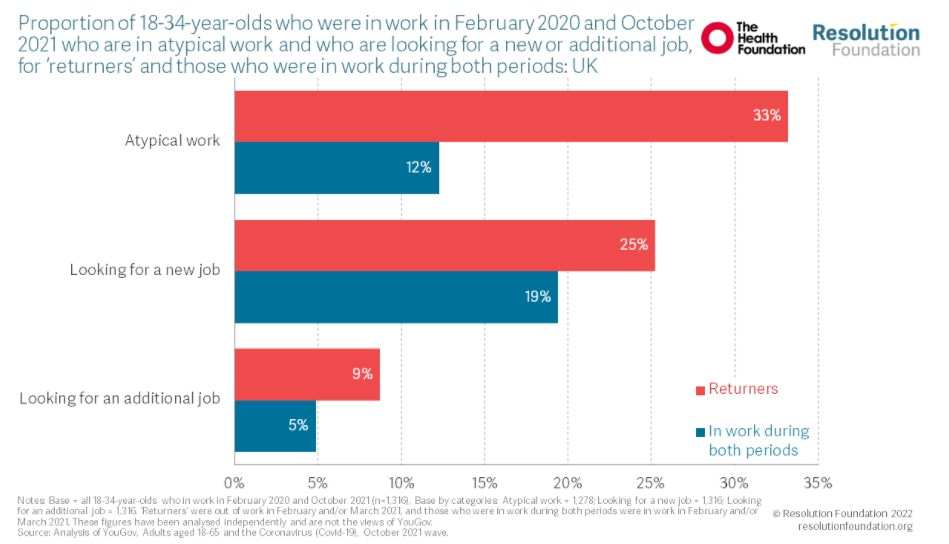|
The number of people on zero hours contracts once again broken through the one million barrier, according to the latest data from the Office for National Statistics. The data shows that, during the period October to December 2021, 1,030,000 people reported that they were employed on zero hours contracts. This is equivalent to 3.2% of the people in employment. The last time that the number of people on zero hours contracts exceeed one million was for the period April to June 2020, during the first quarter of the pandemic. At that time, the number of reported zero hours contracts was 1,076,000. After that, the number of people on zero hours contracts fell to as low as 879,000 during the third national lockdown (January to March 2021), before rising again. Just as the UK employment rate continues to rise, it is quite clear that Covid only provided a temporary blip in the rise in the use of zero hours contracts. While the number of zero hours contracts has reached its second highest level since records began, the ONS data also shows that the the proportion of people employed on zero hours contracts who say they are working full-time hours has fallen to its lowest level of 30.5%. Conversely, the proportion of zero hours workers who say they are working part-time hours has increased to its highest level of 69.1%. Unfortunately, the decrease in the number of people on zero hours contracts working full-time hours since the first quarter of 2020 has not been reflected in an equivalent increase in the number of people not employed on zero hours contracts and working full-time. At the same time, while the number of people on zero hours contracts working part-time hours has increased to its highest levels, the humber of people not on zero hours contracts who are working part-time hours has actually fallen. These figures suggest that, while the amount of work available to staff on zero hours contracts is decreasing, employers are still offering regular work to zero hours workers without the benefits of permanent employment.
By Pravin Jeyaraj Zero Hours Justice welcomes the decision by London-based Southwark Council to stop using zero hours contracts for its care home staff. Under its new Residential Care Charter, the council has committed to no longer put staff on zero hours contracts in place of permanent contracts, unless individual members of staff specifically ask for it. According to the latest data from the Office of National Statistics, almost a fifth of people employed on zero hours contracts are in the health and social care sector. The data also shows that more than a third (33.7%) of those on zero hours contracts describe themselves as working full-time and, for those who say they are working part-time, the average usual weekly hours is 25.5. This suggests that many employers are using zero hours contracts when the work is fairly regular and could be said to be de facto permanent. In addition to the ban on zero hours contracts, Southwak Council will also pay care home staff at least the London Living Wage (£11.05 per hour), pay them for a proper handover between shifts and provide free training that must be taken during working hours. If you are an employer does do not use zero hours contracts, or you are able to commit to using them in accordance, with our minimum criteria, you are welcome to apply to join our accreditation scheme.
By Pravin Jeyaraj rThe UK employment rate may be rising, although it has not quite reached pre-pandemic levels, but official figures masks a disturbing reality. According to a study by the Resolution Foundation, young people aged 18-34 whose work was interrupted between February 2020 and summer 2021 ("returners") were more likely to in insecure work, compared to those who were able to continue working during this time. In a survey of 6,100 adults, it was found that 33% of young returners were in atypical work (temporary contract, zero hours contract, agency work or variable hours contracts), compared to 12% of those who stayed in work during the pandemic. On top of that, it was also found that 25% of returners were looking for a new job and 9% were looking for an additional job, compared to 19% and 5% of those who could stay in work during the pandemic, suggesting that those who have returned to work are slight less satisfied with their current working conditions. The pandemic also had an impact on how young people felt about working in their sector. A third of young people working in highly affected sectors, such as hospitality, before the pandemic, had changed sectors between February 2020 and October 2021. Only 14 of those working sectors that were less affected by the pandemic decided to switch. Of those who moved out of a highly-affected sector, 30% moved to a different sector and just 3% moved to highly-affected sector. It's incredibly worrying that a lot of young people who were unable to work during the pandemic, through no fault of their own, are finding it difficult to find secure work. This will have had an impact on their earnings and could worsen both the cost of living crisis and their ability to plan for the future. It is also clear, from the study, that young people do not want to have insecure work and taking the opportunity to switch to sectors that can offer more secure work.
|
contactFor press enquiries or permission to reuse content, please contact: Archives
June 2024
CATEGORIES
All
|
|
Company No: 12417909 Registered Office: 38 Coney Street, York, Y01 9ND
|



 RSS Feed
RSS Feed


